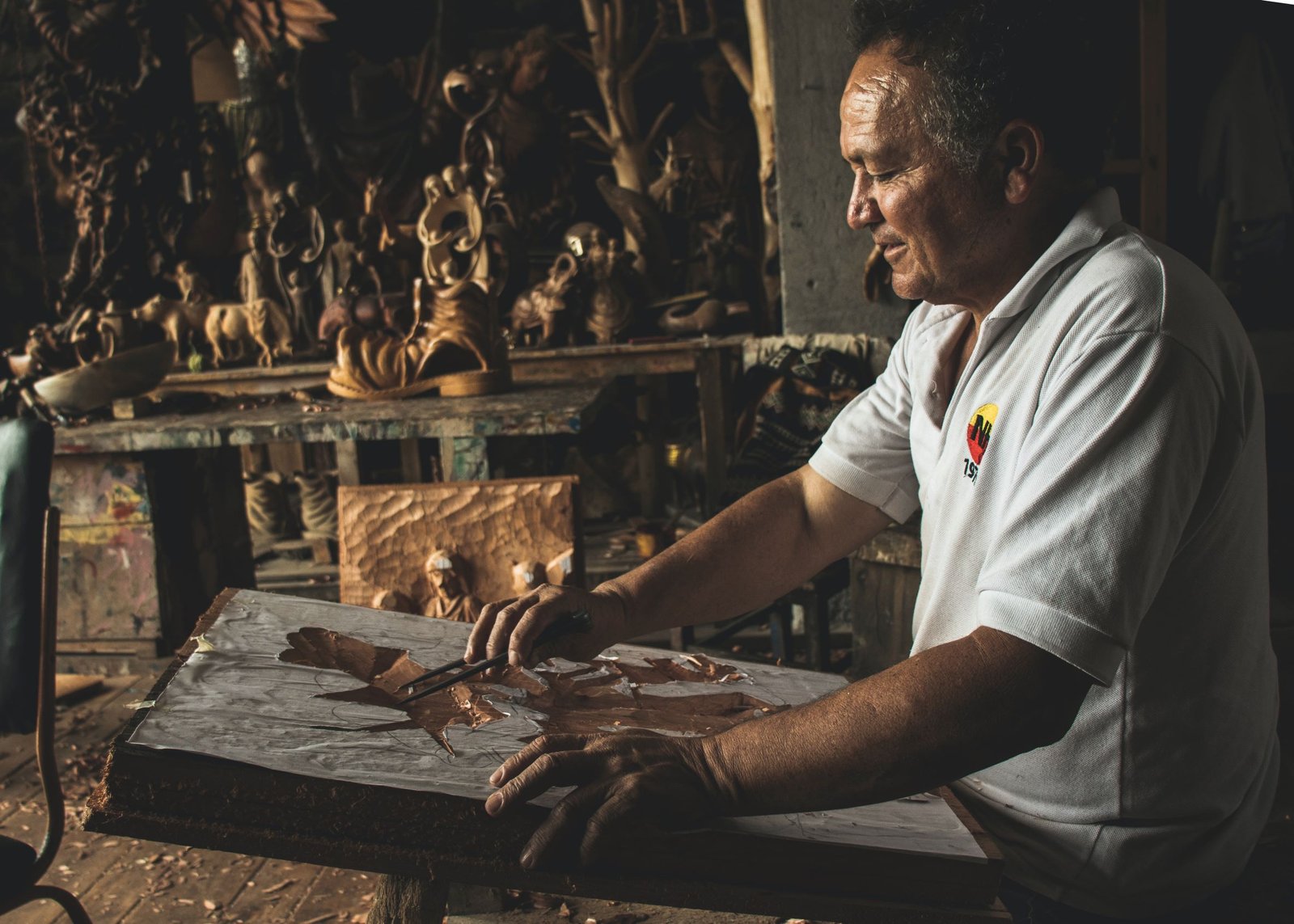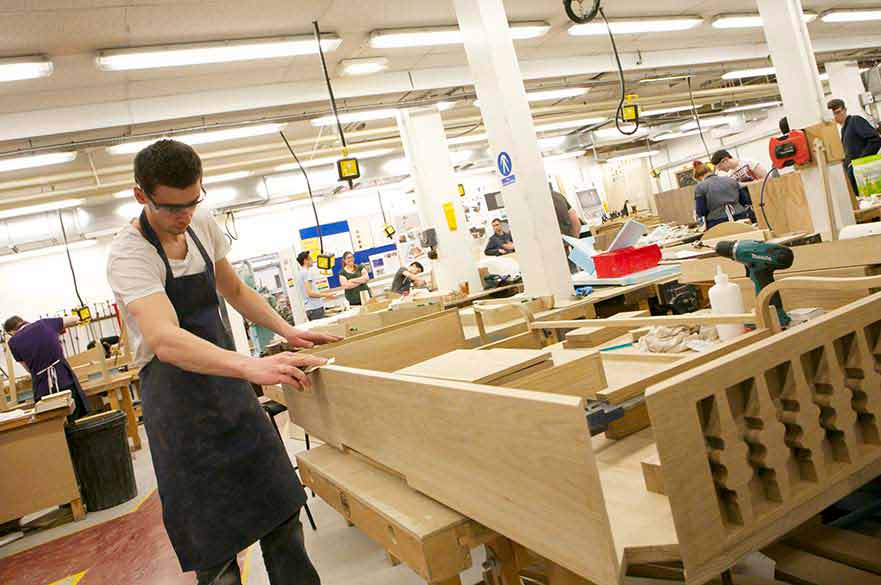
Disclaimer: As an Amazon Associate, “Furniture UK” earns from qualifying purchases.
Two directions are apparent when we observe the current trend in how education prepares our youth. Though a torrent of courses is being introduced yearly, most have to do with digital skills and vague cross-industry domains. Our child, so it seems, is becoming the jack of all trades and the master of none. Luckily, however, this trend started showing signs of reversal.

Trade schools and vocational training universities have been struggling lately. People aged 20-25 build their careers in what seemed to be an unorthodox format just a decade ago. Joining digital startups, many are profoundly disconnected from manual work.
Since woodworking classes disappeared from the curriculum, prestigious UK furniture online design universities suffered a hit. They rely primarily on international students. But after signing up for courses that hardly lead to a job, young people again began showing interest. The push, likely, is coming from parents who want their children to study things that will lead to a job.
Furniture design universities offer a change of direction
Running several scholarship programs, prestigious educational centres such as Buckinghamshire New University and the art, architecture, and design faculty at London Met are trying to help young people acquire skills in high demand.
Students graduate with an MA in furniture but attend other trade classes, such as jewellery and textiles. They also learn about interior design, graphic design, product design, fashion, and illustration. Most of these skills rely on interdisciplinary study, where students become confident in theory and manufacturing. They get to work on their projects, learning the fundamentals through action while taking advantage of the sophisticated workshop facilities these educational centres offer.
Unlike other college degrees where completion of the curriculum is expected before entering the job market, Furniture design universities encourage their students to build up their portfolio and become employable right away. Working with great tutors closely connected to the industry, they take full advantage of the mentorship process.

Educators are well versed in theory, teaching research methodology through product design and user experience. The goal is to be capable of materializing virtual models and designing things people are likely to use.
Recent reports suggest that many students are coming back to trade universities, taking full advantage of this hands-on learning approach. With an array of classes, facilities, and tools at their disposal, they enjoy significant autonomy.
Furniture design is coming back to life as part of a global trend
The market nowadays demands custom products and an ever-increasing array of diversification. This, in turn, creates opportunities rarely seen before. While we are not living in the “throw-away economy” that Alvin Toffler predicted 70 years back, the rate of change in consumerism habits accelerates at a rapid clip.
Trends replace one another indefinitely, and the turnaround is getting faster. This creates job opportunities for almost every product designer. With the powerful internet tool, connection, communication, and looking for prospects have never been easier.
If you are familiar with the blue-collar renaissance, the Future of trade work looks bright. But another trend is at play as well. The work of Mike Rowe has aided trade universities recently. Host of the TV show “Dirty Jobs” and a celebrity in his own right, it is in him that they found their most eloquent advocate.
His foundation, WORKS, educates the youth and parents on the importance of trade work. According to him, meaningful careers can be found in the trades, leading to people being beneficial to society while making a decent living.
As he often tells people, there is a shortage of young men and women willing to get their hands dirty. If one knows them, the opportunities for stepping in are everywhere. This creates a kill gap that has grown over the past decade and is now bigger than ever. Mike also talks about the societal and individual consequences of devaluing blue-collar work. In his view, it can turn society prof and disconnect from its needs. Luckily, according to him, the trend s about to reverse. The US, and now evidently the UK and the rest of Europe, are showing much more evident signs.
The Future of furniture design courses
Skilled work, it seems, is becoming increasingly popular. When there is a shortage of people willing t work with their hands, the market values them even more.
I did a small survey before writing this article, leading me to interview several people in Eastern Europe. When asked about textile and furniture work, many agreed that their workforce is immigrating elsewhere.
“It is hard to find a good furniture designer nowadays. The skilled people who decided to stay are swamped with work, and you must make a reservation several months prior,” – said Meri Popova from Bulgaria.
“Since our country entered the European Union, skilled tradesmen have flown abroad. There is hardly anyone left. My brother and his family moved two years ago. He is a carpenter.” – said another man from Romania who wanted to remain anonymous.
Reading these statements, the maxim writes itself – if most people are leaving their homes to come and work in the UK and Western Europe, it must signal a significant shortage of skilled professionals. Therefore, the Future of trade universities and product design courses looks bright. Over a dozen universities offer quality furniture design education in the UK. Such include the De Montfort University, University of Wolverhampton, Sheffield Hallam University, Ulster University, York St John University, Birmingham City University, Oxford Brookes University, and of course, Buckinghamshire New University in High Wycombe.
They offer BA degrees and between 80-95% employment rates. Suffice it to say; such a number is unusual regardless of the industry. Students can learn principles o three-dimensional design, manufacturing technology, culture, visual communication, and technical definition and have many hours of workshop practice, ultimately leading to a rich portfolio and numerous job prospects.
Browse Furniture UK Online and keep updated with what`s happening in the UK Furniture industry.




![Report on the British educational furniture manufacturers group [BEFMG]](https://thehome.co.uk/wp-content/uploads/2018/02/report-furniture-uk.jpg)



